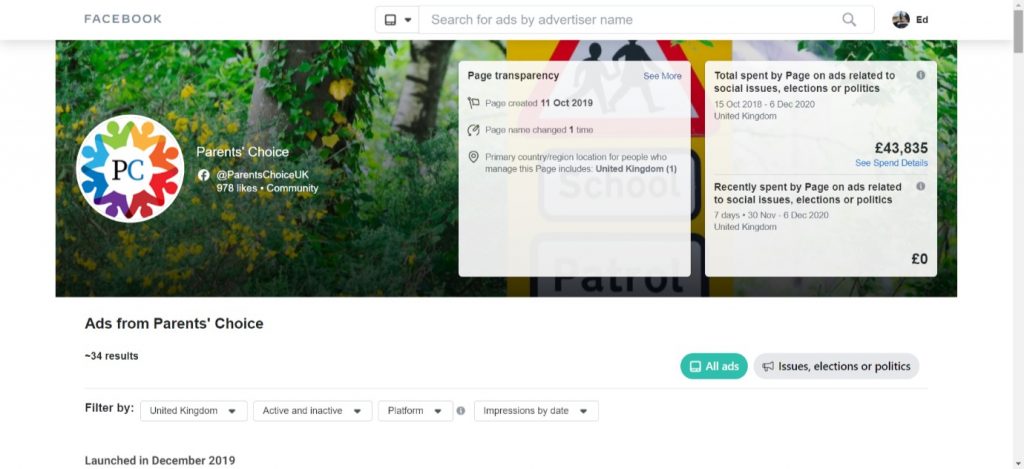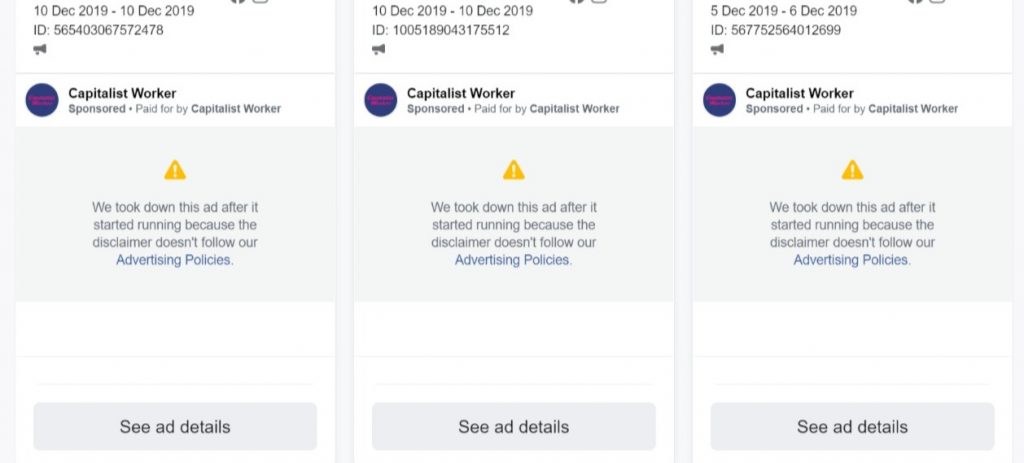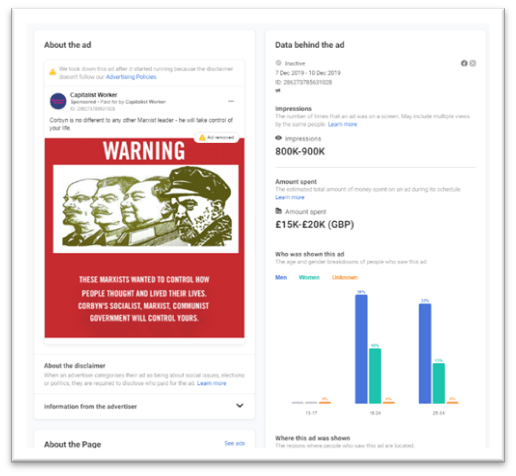There’s a really good case to say that the 2019 general election in Britain was the most dishonest, the most fraudulent election in British political history.
(Patrick Geogeghan, Open Democracy)
The 2019 General Election – held just over a year ago – was supposed to be different. Concerns about the role of social media in the Brexit referendum, the 2016 US Presidential Election and other polls meant that tech giants like Google and Facebook had taken steps to become more transparent.
While much investigative work on ‘fake news’, misinformation and related matters was done during and immediately after the 2019 election campaign, coverage waned as the Coronavirus pandemic came to dominate the news agenda.
One year on, Truth Defence looks back at the 2019 General Election.
A key issue then, as now, is that there is no legal requirement for digital ads to carry an imprint – information about who paid for the ad – as there is with physical election material. This means that anonymous individuals and groups can target voters on social media with near impunity.
Facebook’s solution to this problem is its Ad Library. This innovation means that all ads that Facebook deem to be about “social issues, elections or politics” are now archived on a searchable database and available for scrutiny for seven years. Facebook says of such ads:
“Transparency is a priority for us to prevent interference in elections, so the Ad Library also shows you additional information about these ads, such as who funded the ad, a range of how much they spent and the reach of the ad across multiple demographics.”
There is no doubt that the Ad Library makes a significant contribution to improving transparency, but Facebook still have some way to go. Political groups are easily able to present themselves as non-political entities, and in some cases can avoid revealing their identities at all.
Such tactics were used by some of the large number of well financed anti-Labour Facebook pages that sprang up just before the election and disappeared immediately after it. Many of these appeared deliberately obscure in origin yet spent significant sums in highly targeted Facebook ad campaigns. Different pages used different levels of deception, but all were successful in delivering simplistic and often vitriolic ads to thousands of voters.
One example is Parents’ Choice, who spent £43,835 on targeted attack ads between the creation of their page on 11th October 2019 and the election two months later.

No information about the provenance of Parents’ Choice is offered on the page, though their rainbow-paperchain logo and ‘Community’ status seem designed to suggest an inclusive parenting group. In fact, Parents’ Choice is a nakedly political page devoted to attacking Labour’s stance on private schools.
Facebook Ad Library shows that Parents’ Choice’s ad campaign was paid for by a Richard Patrick Tracey. Only further research reveals that the late Mr Tracey was a Conservative MP and former minister in the Thatcher administration. It is unlikely that the hundreds of thousands of UK Facebook users who received ads from Parents’ Choice would have been aware that they were being targeted by a former Conservative minister.
Worse still is a page called Capitalist Worker. They provided no identifying information at all but still managed to spend £37,760 placing “informed analysis into citizens’ Facebook feed” [sic]. Examples of this “informed analysis” include posting a picture of a man in flat cap and a photograph from the 1970s.


All forty of the ads that Capitalist Worker ran during the election campaign were taken down after they started running because they breached Facebook rules on providing a disclaimer – at no point was it ever clear who paid for their ads.
However, these repeated take downs did not persuade Capitalist Worker to provide verifiable disclaimer information – and it is easy to see why.

Capitalist Worker’s first ad – in which they describe themselves as an ‘Education Company’ – was set to run between 23rd November and 6th December 2019 and cost around £900 (Facebook Ad Library only gives approximate figures). Though it was taken down early, the ad still achieved 90K-100k carefully targeted impressions, according to the Ad Library. Perhaps the judgement at Capitalist Worker was that the time lag between placing an ad and Facebook removing it was such that even non-compliant ads achieved a level of cut-through that made financial and political sense.
In the final week of the campaign the same thing happened on a much larger scale. A series of three crude Capitalist Worker ads – costing around £20,000 – recorded a staggering 800K-900K impressions before being removed. Put another way: on the eve of a General Election, close to a million largely English Facebook users of voting age had a political ad pushed into their feed by a page that was breaking Fakebook’s own rules.

There are questions about why Facebook accepted the non-compliant ads in the first place and why, when run, they repeatedly took so long to take them down.

